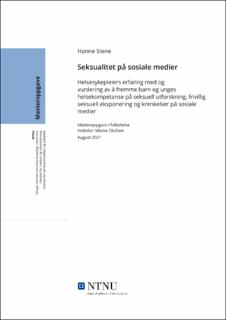| dc.contributor.advisor | Olufsen, Vibeke | |
| dc.contributor.author | Stene, Hanne | |
| dc.date.accessioned | 2021-11-04T18:19:16Z | |
| dc.date.available | 2021-11-04T18:19:16Z | |
| dc.date.issued | 2021 | |
| dc.identifier | no.ntnu:inspera:78875574:47224718 | |
| dc.identifier.uri | https://hdl.handle.net/11250/2828021 | |
| dc.description.abstract | Bakgrunn: Helsesykepleier har en helsefremmende og forebyggende rolle i folkehelsearbeidet i kommunen, og nasjonale faglige retningslinjer gir en sterk anbefaling om at skolehelsetjenesten skal bistå skolen i undervisning om kropp og seksualitet. Barn og unge tilbringer stadig mer av fritiden sin på sosiale medier, og dette har også blitt et sted hvor de utforsker sin seksualitet, både på godt og vondt. Denne studien har fokus på hvordan seksualitet på sosiale medier inkluderes i helsesykepleiernes arbeid i skolen.
Hensikt: Målet med studien var å undersøke helsesykepleieres erfaring med og vurdering av å fremme barn og unges helsekompetanse på seksuell utforskning, frivillig seksuell eksponering og krenkelser på sosiale medier.
Metode: Studien er en kvalitativ intervjustudie med bruk av seks semi-strukturerte forskningsintervju av helsesykepleiere som arbeider i skolehelsetjenesten. Datamaterialet ble transkribert og analysen ble gjennomført ved hjelp av systematisk tekstkondensering.
Resultater: Studien viser at helsesykepleierne bidrar til å fremme barn og unges helsekompetanse gjennom undervisning, refleksjon, planlagte samtaler i nasjonalt program, åpen-dør-tilbud hvor barn og unge selv tar kontakt, samt ved å være synlig i skolemiljøet. Og helsesykepleierne samarbeider med flere aktører i dette arbeidet. Informantene har inkludert bruk av sosiale medier i pubertets- og seksualundervisningen, men til tross for at de ønsker å formidle både risikoer og gleder i undervisningen, viser studien at undervisningen knyttet til seksualitet på sosiale medier ofte har et negativt fokus. Informantene opplever at noen barn og unge deler seksualiserte bilder av seg selv og dermed risikerer at slike bilder blir spredt. Informantene ser at det knytter seg mye skam og skyldfølelse til dette og de ønsker å formidle til barn og unge at de er en trygg voksen som de kan søke hjelp fra, også i slike situasjoner.
Konklusjon: Resultatene i denne masteroppgaven viser at helsesykepleier bruker ulike metoder for å gi barn og unge helsekompetanse, og de samarbeider med ulike aktører for å nå dette målet. Videre viser studien behov for å utvikle evidensbasert undervisningsmateriell som er tilpasset helsesykepleiers arbeid i skolen, samt helhetlige samarbeidsstrukturer mellom skolen og skolehelsetjenesten og innad i helsesykepleiertjenesten. Dette vil være nødvendig for å gi barn og unge et helhetlig, kunnskapsbasert og likeverdig tilbud over hele landet. | |
| dc.description.abstract | Introduction: The school nurse has a health-promoting and preventive role in the public health work in the municipality, and national professional guidelines give a strong recommendation that the school health service should assist the school in teaching children and youth about their body and sexuality. Children and youth are spending increasingly more of their free time on social media, and it has also become a place where they explore their sexuality, for better or worse. This study focuses on how sexuality on social media is included in the work of the school nurses.
Aim: The aim of the study was to examine health nurses' experience and assessment in promoting children and young people's health competence in sexual exploration, voluntary sexual exposure and violations on social media.
Method: The study is a qualitative interview study using six semi-structured research interviews of school nurses working in the school health service. The data material was transcribed and the analysis was performed using systematic text condensation.
Results: The study shows that the school nurses contribute to promoting children and youth’s health literacy through teaching, reflection, planned conversations in the national program, open-door-function where children and youth themselves make contact, and by being visible in the school environment. And the school nurse collaborate with several actors in this work. The informants have included the use of social media in puberty and sex education, but despite the fact that they want to convey both risks and pleasures in the teaching, this study shows that the teaching related to sexuality on social media often has a negative focus. The informants experience that some children and young people share sexualized images of themselves and thus risk that such images are spread. The informants see that there is a lot of shame and guilt associated with this and they want to convey to children and young people that they are a safe adult from whom they can seek help, even in such situations.
Conclusion: The results of this master's thesis show that school nurses use different methods to provide children and young people with health literacy, and they collaborate with different actors to achieve this goal. Furthermore, the study shows the need to develop evidence-based teaching material that is adapted to the school nurse's work in the school, as well as holistic collaboration structures between the school and the school health service and within the school nurse service. This will be necessary to provide children and youth with a comprehensive, knowledge-based and equal offer throughout the country. | |
| dc.language | nob | |
| dc.publisher | NTNU | |
| dc.title | Seksualitet på sosiale medier - helsesykepleiers erfaring med og vurdering av å fremme barn og unges helsekompetanse på seksuell utforskning, frivillig seksuell eksponering og krenkelser på sosiale medier | |
| dc.type | Master thesis | |
